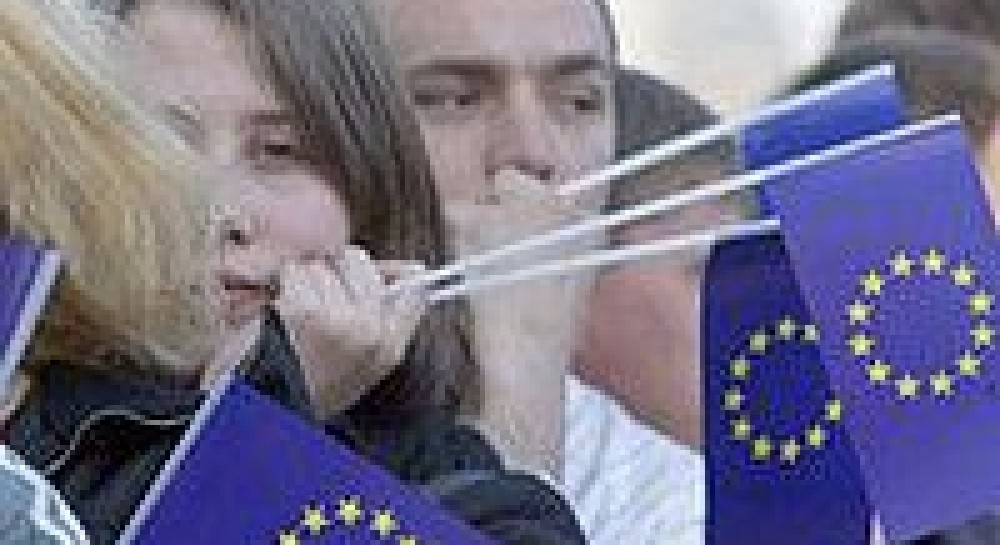
Ukrainian Crossroads
Ukraine`s political leaders eventually agreed that the only way to settle their differences was to call a new election. This came as a great relief to Ukraine`s friends across Europe, not least because the main political parties invited the EU to help...
Ukraine`s gradual but sometimes uneven progress toward democracy has shown once again that this path is never easy. Nothing worth fighting for ever is. Institutional models can be borrowed from established democracies and adapted to local circumstances with some success.
But acquiring the habits and culture of a democratic society, without which even the best-designed institutions are prone to malfunction, is an altogether more difficult task. We need to be patient and respectful, especially when looking at countries without long democratic traditions.
All this must be kept in mind when trying to understand the significance of this month`s parliamentary election in Ukraine. The Orange Revolution of 2004 was a breakthrough because it removed electoral fraud as a routine fact of political life in Ukraine and made proper democratic competition possible for the first time.
But that single event was never going to wipe away at a stroke the legacy of authoritarianism that continues to weigh so heavily on the present. It should surprise no one that there have been setbacks as well as successes in the last three years.
The recent period has been particularly challenging, largely because last year`s parliamentary election failed to produce a clear result in favor of one political bloc or another.
To his credit, President Viktor Yushchenko resisted partisanship and saw this as an opportunity to create a new dynamic in Ukrainian politics based on a spirit of national reconciliation and the shared objective of European integration.
A broad power-sharing coalition was formed last summer between Mr.Yushchenko`s Our Ukraine party and the Party of the Regions, led by his rival for the presidency, Viktor Yanukovych, who was appointed prime minister.
If that experiment ended in constitutional crisis and the need for a new election, it is because not everyone entered into it with the same high-minded intentions.
A struggle for power ensued in which parliamentarians from Our Ukraine and another party defected to the Party of the Regions under questionable circumstances, and parliament sought to strip President Yushchenko of his constitutional prerogatives.
Sorting out the rights and wrongs of that situation hardly matters now. The important fact is that Ukraine`s political leaders eventually agreed that the only way to settle their differences was to call a new election. In doing so they gave themselves another chance to demonstrate their commitment to European values.
This came as a great relief to Ukraine`s friends across Europe, not least because the main political parties invited the European Union to help monitor the election to ensure that it meets international standards.
That invitation was accepted in good faith and in the belief that a cross-party consensus existed to guarantee a fair and democratic contest. Regrettably, the integrity of that consensus has been called into question by the statements and actions of some political leaders.
The decision by one bloc to reconvene the already dissolved parliament on Sept. 4 might be dismissed as a political stunt, but the statement by the justice minister that it could be a reason to cancel the new election threatens to plunge Ukraine into a crisis it can ill afford.
This is a delicate moment for Ukraine. It will probably secure the hard-won goal of World Trade Organization accession later this year, opening the way for a new chapter in relations with the EU. An enhanced EU-Ukraine bilateral agreement is due to be negotiated, with a free-trade area as its centerpiece.
This would not give Ukraine the EU candidate status it desires, but it would put the country on a fast track toward deeper economic and political integration and would constitute a genuine breakthrough.
This prospect has been greatly strengthened by the new realism in the attitude of Ukraine`s leaders toward Europe and their willingness to put the substance of integration before the theology of accession status.
But these gains are predicated on Ukraine`s continued progress as a country. They would be put in jeopardy if it relapsed into a state of semipermanent crisis without a functioning government to negotiate with, or any clear sense of where ultimate political authority lay.
The election is an important opportunity for Ukraine not only to produce a stable government with a clear mandate, but to demonstrate that it is a country that Europe can do business with. If Ukraine becomes known as the kind of country where political agreements are broken on a whim, it will have damaging repercussions for its European ambitions.
Of course, the European Union cannot tell Ukraine what to do. We forfeited that right when we declined to offer it the prospect of membership, which would have allowed us to assess its policies against the accession criteria that apply to all potential member states. But we can and should make it clear that actions have consequences.
The Sept. 30 election is a chance for Ukraine to prove the doubters wrong and settle its internal differences in a mature and democratic fashion. The sooner all of its leaders are able to recommit themselves to that course, the better for Ukraine`s European prospects.
This article was monitored by the Action Ukraine Monitoring Service for the Action Ukraine Report (AUR), Morgan Williams, SigmaBleyzer, Editor.

